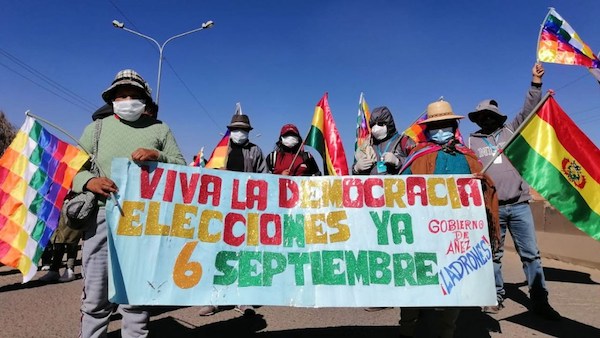In the early hours of this Monday morning, the indefinite general strike and roadblocks began throughout Bolivia, called by the Central Obrera Boliviana (COB) and the organizations that constitute the Unity Pact, which demand that the Supreme Electoral Tribunal respect the election date established by law for September 6.
These pressure measures were approved in the town hall held on July 28 in the city of El Alto, at the end of a massive march that converged on La Ceja, in which, together with the COB, the National Confederation of Indigenous Women of Bolivia “Bartolina Sisa”, the Unique Federation of Workers of La Paz “Tupac Katari” and other youth and neighbourhood organizations participated.
According to reports received from different sectors of the country, several strategic points, especially in the western region of the country and in the area of the valleys, have been taken over by social organizations interrupting the movement of motorized vehicles. It is estimated that over the next few hours the blockade will extend to most of the national territory.
The Central Obrera Boliviana, through a directive, called on its members and the Bolivian population to begin a nationwide road blockade and a general strike, starting at zero hour on Monday. The Ponchos Rojos of Omasuyos province and its forty cantons announced the blockade of roads throughout their province and surrounding areas. The Unique Confederation of Peasant Workers of Bolivia (CSUTCB) informed that they join the mobilizations, as well as the FEJUVEs of the cities of El Alto and La Paz who asked the population to stock up on food because the blockade will be complete.
The organizations of the city of El Alto announced in the early hours of this Monday, August 3, the blockade of a thousand corners, with which they intend to completely paralyze the city. Similar announcements have been made from the city of Cochabamba, where radical compliance with the pressure measure is also expected.
Despite the fact that, almost as an emergency, the presidency of the electoral body called the top leaders of the COB and other social organizations to a meeting last Friday to inform them of the reasons for the postponement, seeking their acceptance on the new date set for October 18, forty days after the scheduled date, the call for the general strike has been kept in its entirety.
As soon as the pressure measures were confirmed, the government responded with the announcement of criminal proceedings against the top executives of the COB, Juan Carlos Huarachi, Congresswoman Betty Yañiquez, and former President Evo Morales, for crimes against public health, public instigation to commit a crime, and other criminal offences, with the clear intention of stopping the protest actions approved by the social organizations.
In this respect, the head of the organization that groups the workers of Bolivia, Juan Carlos Huarachi, said, “I will not falter. if it is a crime to fight for the life and health of the Bolivian people, here I am, I will not flee, I will stand up for my country, for my people,” adding that the general strike is in force and that the road blockade begins today, Monday, August 3.
Factory, mining, peasant and union sectors, among others, have stated that they will fully comply with the COB’s decisions. It is expected that the COB will issue new instructions about the implementation of the measure, as well as permanent evaluations about its development.
Meanwhile, historic indigenous leader Felipe Quispe “El Mallku” said that the road blockade will be total “the mobilizations will be more forceful and revolutionary because the government mocked us. The elections should have been on September 6, and the people are being taunted. It is too late to block the corral because the donkey is already dead inside. From the first day that Covid 19 arrived, things have been happening,” said the leader.
In the last few hours, the government announced the closure of the 2020 school year, which some analysts believe is an attempt to demobilize teachers, especially in rural areas, where the government has publicly expressed its total support for the strike decreed by the main Bolivian workers’ organization and has already instructed them to comply fully.
Another sector in conflict is that of Transporte Libre, which decided not to pay its debts to the banks until December 31, as established by Law 1294. The executive of the Confederation that groups the drivers of this sector, William Condori, said that this sector is one of the most affected by the quarantines and they do not have the capacity to comply with their obligations with the private banks. Ninety percent of the members of this sector have debts with the banks.

